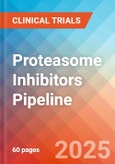Proteasome Inhibitors Understanding
Proteasome Inhibitors: Overview
Proteasomes play a necessary role in cell survival, DNA repair and the proliferation of malignant cells. Proteasomes also play an active role in normal cellular functions, and in the degradation of misfolded or mutated proteins. The mechanism by which Proteasome Inhibitors lead to cell death is diverse and affects many pathways utilized in cancer cells. One putative mechanism of cytotoxicity is inhibition of the NF-kB pathway, a pro-survival pathway for many cell types, especially those of hematopoetic lineages.Multiple putative mechanisms of cellular toxicity have been proposed for Proteasome Inhibitors (PIs). Included amongst these is direct induction of apoptosis through c-Jun NH2-terminal kinase (JNK) and p53. The expression of p53, a known tumor-suppressor important in activating cell death under diverse circumstances, is induced by treatment with PIs, which can induce apoptosis even in the presence of mutant p53.
Since Proteasome Inhibitors have been impressively effective in the treatment of hematologic malignancies, they continue to be an area of interest for new indications and to improve existing PI regimens. Clinical trials of PIs in combination with other agents are being conducted in leukemias, lymphomas, solid tumors and GVHD. PIs continue to be developed that might target the proteasome at different sites to overcome resistance or have activity in different malignancies. Areas of resistance include hyperactivation of the trypsin-like (β2) and caspase-like (β1) proteolytic sites to compensate for inactivation at the chymotrypsin-like (β5) site. Proteasome Inhibitors target cellular mechanisms of protein degradation by blocking the β proteolytic subunits of the 20s proteasome.
Report Highlights
The companies and academics are working to assess challenges and seek opportunities that could influence Proteasome Inhibitors R&D. The therapies under development are focused on novel approaches for Proteasome Inhibitors.Proteasome Inhibitors Emerging Drugs Chapters
This segment of the Proteasome Inhibitors report encloses its detailed analysis of various drugs in different stages of clinical development, including phase III, II, I, preclinical and Discovery. It also helps to understand clinical trial details, expressive pharmacological action, agreements and collaborations, and the latest news and press releases.Proteasome Inhibitors Emerging Drugs
Marizomib: Celgene
Marizomib is a proteasome inhibitor derived from a novel marine-obligate actinomycete that belongs to the β-lactone-γ-lactam superfamily of Proteasome Inhibitors. In in vitro experiments, marizomib has demonstrated irreversible binding to and inhibition of all 3 proteolytic subunits of the human proteasome complex, resulting in inhibition of proteasome activity.It is currently in Phase III stage of development and is being developed by Celgene.
Carfilzomib: Amgen
Carfilzomib is a small molecule proteasome inhibitor (PI). It is approved for multiple myeloma. It is currently in Phase III stage of development and is being developed by Amgen.Proteasome Inhibitors: Therapeutic Assessment
This segment of the report provides insights about the different Proteasome Inhibitors drugs segregated based on following parameters that define the scope of the report, such as:Major Players working on Proteasome Inhibitors
There are approx. 10+ key companies which are developing the Proteasome Inhibitors. The companies which have their Proteasome Inhibitors drug candidates in the most advanced stage, i.e. Phase III include, Celgene.Phases
The report covers around 10+ products under different phases of clinical development like
- Late-stage products (Phase III)
- Mid-stage products (Phase II)
- Early-stage products (Phase I/II and Phase I) along with the details of
- Pre-clinical and Discovery stage candidates
- Discontinued & Inactive candidates
Route of Administration
Proteasome Inhibitors pipeline report provides the therapeutic assessment of the pipeline drugs by the Route of Administration. Products have been categorized under various ROAs such as- Infusion
- Intradermal
- Intramuscular
- Intranasal
- Intravaginal
- Oral
- Parenteral
- Subcutaneous
- Topical
Molecule Type
Products have been categorized under various Molecule types such as
- Vaccines
- Monoclonal Antibody
- Peptides
- Polymer
- Small molecule
Product Type
Drugs have been categorized under various product types like Mono, Combination and Mono/Combination.Proteasome Inhibitors: Pipeline Development Activities
The report provides insights into different therapeutic candidates in phase III, II, I, preclinical and discovery stage. It also analyses Proteasome Inhibitors therapeutic drugs key players involved in developing key drugs.Pipeline Development Activities
The report covers the detailed information of collaborations, acquisition and merger, licensing along with a thorough therapeutic assessment of emerging Proteasome Inhibitors drugs.Proteasome Inhibitors Report Insights
- Proteasome Inhibitors Pipeline Analysis
- Therapeutic Assessment
- Unmet Needs
- Impact of Drugs
Proteasome Inhibitors Report Assessment
- Pipeline Product Profiles
- Therapeutic Assessment
- Pipeline Assessment
- Inactive drugs assessment
- Unmet Needs
Key Questions
Current Scenario and Emerging Therapies:
- How many companies are developing Proteasome Inhibitors drugs?
- How many Proteasome Inhibitors drugs are developed by each company?
- How many emerging drugs are in mid-stage, and late-stage of development for Proteasome Inhibitors?
- What are the key collaborations (Industry-Industry, Industry-Academia), Mergers and acquisitions, licensing activities related to the Proteasome Inhibitors therapeutics?
- What are the recent trends, drug types and novel technologies developed to overcome the limitation of existing therapies?
- What are the clinical studies going on for Proteasome Inhibitors and their status?
- What are the key designations that have been granted to the emerging drugs?
Key Players
- Kezar Life Sciences
- Amgen
- Celgene
- Cantex Pharmaceuticals
- Takeda
- Principia Biopharma
Key Products
- KZR 616
- Carfilzomib
- Marizomib
- Dicopp
- TAK-169
- Research programme: Proteasome Inhibitors
This product will be delivered within 2 business days.
Table of Contents
Companies Mentioned (Partial List)
A selection of companies mentioned in this report includes, but is not limited to:
- Kezar Life Sciences
- Amgen
- Celgene
- Cantex Pharmaceuticals
- Takeda
- Principia Biopharma








